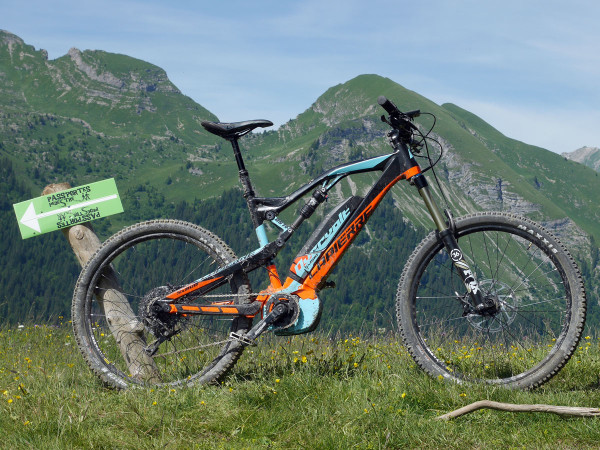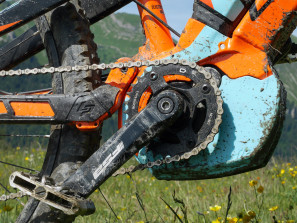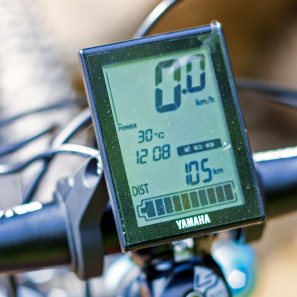There is no doubt that e-bikes provide a great alternative in various situations like commuting, but there is a lot of concern on whether they should be accepted allowed on the trails. The concern for e-bikes on the trails is less about people losing their KOMs and more about safety (newbies doing speeds they’re not capable of handling, etc.), avoiding damage to the trails, and the difficulty of regulating the amount of e-power whether it’s pedal assist or full-throttle.
Aside from using aero-bars on a group ride and a Softride beam for downhill, there has not been a more talked about or shunned piece of equipment more than e-bikes heading past the treeline. Now that mountain bike access to wilderness areas is being pushed for those of us without motors by the STC, the topic of powered assistance is drawing even more of a debate. The topic concerns NEMBA’s (New England Mountain Bike Association) Executive Director, Philip Keyes, enough that he felt it necessary to draw up this open letter to IMBA…
OPEN LETTER TO IMBA:
ABOUT WILDERNESS,THE SUSTAINABLE TRAILS COALITION AND E-MTBS
TO: Mike Van Abel, IMBA Executive Director
Robert Winston, Chair, IMBA’s Board of DirectorsFROM: Philip Keyes, Executive Director, New England Mountain Bike Association
December 7, 2015
Via emailDear Mike and Robert,
Once again, I’m writing you and IMBA’s Board of Directors on behalf of the New England Mountain Bike Association to urge you to support the Sustainable Trails Coalition’s initiative to allow human-powered travel in our nation’s wildlands. Last I wrote, it seemed that you and your Board were considering supporting the STC, but given IMBA’s December 1stBlog Post, this does not appear to be the case – hence this open letter to you and your Board.
Also, I am writing you to ask IMBA to clarify its position on e-MTBs. We urge you to reaffirm IMBA’s 2010 policy position that mountain biking is a human-powered form of recreation. We hope you will confirm your position that electric-assist mountain bikes should be managed like other motorized vehicles on public, natural surface trails, and not be granted special status on non-motorized trails.
We publically voice these concerns because we believe that these are the two most important national issues facing the mountain bike community today.
I. Regarding IMBA, Wilderness and the Sustainable Trails Coalition
In your August 2015 blog post, IMBA and the Sustainable Trails Coalition, you more than hinted that IMBA was considering offering some level of support to the Sustainable Trails Coalition (STC), and you urged your readers to “stay tuned.”
This was gratifying to hear and we were optimistic that support was going to be offered. However, Mark Eller’s December 1st Blog Post responding to Outside Magazine’s articleabout the STC made it clear that IMBA is not offering any tangible or financial support whatsoever.
We believe that this is a huge mistake and we urge IMBA to reconsider and become active in supporting the initiative to remove the ban on mountain biking in Wilderness.
Please consider the following:
- IMBA’s current strategy to work with Wilderness groups to protect certain trails from becoming Wilderness is compatible with seeking to modify the Wilderness Act or the interpretation of this Act. We do not believe that our or IMBA’s ability to advocate to protect critical mountain bike trails is contingent upon acquiescing with the status quo that bikes do not belong in Wilderness. We believe that land management agencies and Wilderness proponents will work with us even if we make it clear that we do not agree with the ban and are actively seeking to change it.
- IMBA’s current position to not support the STC will negatively impact IMBA regardless of the success or failure of the STC. Conversely, IMBA will benefit by supporting the STC regardless of the outcome. If the Sustainable Trails Coalition is successful at modifying the Wilderness Act without IMBA’s support, IMBA will appear as irrelevant and out-of-date, basically sidelined in what is arguably one of the most important access initiatives ever undertaken by mountain bikers. On the other hand, if IMBA offers no support to STC and STC fails, many mountain bikers around the country will lay blame on IMBA for not getting involved or providing the assistance necessary for success. Not supporting STC is a lose-lose for IMBA. On the other hand, if IMBA supports the Sustainable Trails Coalition it will benefit regardless of the outcome. If the STC initiative is successful, IMBA can truly and deservedly share in that success. If unsuccessful, at least IMBA will be seen as having the fortitude to stand up for mountain bikers and do what is right. As is said, “It is better to have fought and lost than to never to have fought at all.” The mountain biking community will understand this and will support the organizations that fight the good fight.
- We do not believe that introducing legislation to modify the Wilderness Act will result in the gutting of the land protections offered in the Act. We believe this to be Wilderness proponent propaganda. Clearly the intent of the Act is to prevent wildland development and widespread mineral extraction. It is also clearly not Congress’ original intent to ban muscle-powered recreation.
- We believe IMBA’s membership would support the STC, if asked. In one of Vernon Felton’s articles on Wilderness in Bike Magazine , IMBA is quoted as saying that “IMBA’s membership is split on whether mountain bikes should have access to wilderness areas.” We have a hard time believing that there is a 50/50 split, and it’s more likely that it’s only a very small minority who believe that the bike ban is just. IMBA has never surveyed its membership on this issue, and probably should. NEMBA is IMBA Member #150 and we’ve never been asked.
There is still time for IMBA to show concrete and tangible support to STC but it needs to happen soon. Here are some ways we hope IMBA can help the Sustainable Trails Coalition:
- Publically endorse STC’s initiative and urge IMBA’s membership to support STC through financial donations and lobbying their senators and representatives.
- Urge your partners in the bicycle industry to support this campaign. Urge PeopleForBikes to do the same. The bike industry should financially support this initiative but seems to be waiting for IMBA’s green light.
- Make supporting this issue and the proposed legislation IMBA’s number one goal of the 2016 National Bike Summit this March. If IMBA did this, we believe that it will be one of the most well-attended bike summits by mountain bikers ever.
- Utilize IMBA’s lobbyists and staffers to partner with the STC in Washington, DC and actively engage Congress on this issue. This is why IMBA exists.
This fight is winnable. It can be a win for everyone, including IMBA. It will be inspiring to the thousands of advocates around the country and hundreds of thousands of riders around the world to have IMBA on the right side of history on this issue. Otherwise, sadly, IMBA loses.
II. Power-Assisted Electric Mountain Bikes
Moving on to the issue of e-MTBs, we hope that you and your board of directors will reaffirm IMBA’s 2010 policy position that e-MTBs “should be regulated as with other motorized off-road travel.” We are concerned that IMBA is poised to abandon this position.
NEMBA’s position is as follows:
“The recreational use of electric and power-assisted bicycles, ORVs or ATVs on natural surface trails should be managed using the same guidelines and policies as other motorized vehicles.”
Power-assisted bicycles are improving in speed, power, and battery life, and we believe it important for land managers to develop management principles now. NEMBA is also aware that some senior citizens or people with disabilities might want to use these vehicles on natural surface trails. We support this under the ADA guidelines that agencies have already adopted for the disabled.
IMBA recently undertook its own independent study of the impacts of e-MTBs (paid for by the Bicycle Product Suppliers Association and PeopleForBikes) that indicate that the impacts of low-powered Type 1 e-MTBs are about the same as human-powered mountain bikes, not unlike Wilson and Seney’s 1994 study. This data was presented to the bicycle industry at the Interbike Trade show last September.
This raises the question whether IMBA should be engaging in this type of research, and we are very concerned that IMBA is using this data, perhaps under pressure from the bicycle industry, to shift to a more accommodating position on e-bikes on trails.
Bicycle Retailer’s Interbike Show Daily contained two articles indicating that IMBA is becoming more willing to advocate for electric bicycle use on non-motorized trails. The September 17th Show Daily article titled “IMBA Report could open the door to e-MTBs on trails” comments that IMBA’s “study may be the first step toward opening up some trails to e-mountain bikes that are currently closed to them.”
The September 16th Show Daily quotes IMBA’s fact sheet about e-MTBs saying “IMBA recognizes e-MTBs, particularly those equipped with Type 1 pedal assist, are substantially different from other motorized uses, and may warrant a separate category and new management strategies.” The fact sheet goes on to say, “IMBA’s initial study suggests that with proper management, e-MTBs have the potential to offer a beneficial use of public land with acceptable impacts. […] This is a new category of trail use with the capacity to promote outdoor activity and overall health.”
NEMBA strongly disagrees that e-MTBs should be given their own recreational category on public, natural surface trail systems. We urge IMBA to reaffirm its 2010 position that mountain biking is a human-powered, non-motorized form of recreation and that e-bikes are a form of motorized recreation. Both may be appropriate recreational activities, but it’s important to maintain the category of non-motorized trails.
Consider the following:
- For decades, groups like NEMBA and IMBA have defined mountain biking as a non-motorized form of recreation. That definition is the pillar of mountain bike advocacy. Creating a third category for power-assisted vehicles would undermine this basic tenet and significantly blur the distinction between mountain biking and motorized recreation. This will profoundly affect our ability to advocate and gain access to more trails and open spaces. Land managers and environmentalists would once again lump us together with the motorized set, and with all of the negative baggage that goes with it. This has the potential to set mountain bike advocacy efforts back decades.
- Creating a new category for certain types of e-MTBs would create a management nightmare. Currently it is very difficult to distinguish an e-MTB from a regular mountain bike from a distance, and it is even more unlikely that land managers would be able to distinguish a Type I e-MTB from its more powerful brethren, some of which can attain speeds up to 50 MPH or more. Without a huge staff and significant management resources, there would be no way to regulate and police e-MTB use. It is possible, even likely, that land managers would prefer to ban all bicycles from their properties so that they do not need to spend the resources required to distinguish and manage the different categories of bikes. In addition, land management agencies considering creating mountain bike trails or allowing mountain bikes on existing trail networks will not do so if they think they are opening the door to motorized vehicles.
- The technology and the torque of e-MTBs is progressing at a very fast pace and some low-level power-assisted bikes already have “turbo” buttons that dramatically boost their speed and torque applied to the driven wheel. The impacts on the trails will also increase and the social impacts of sharing trails with vehicles that can easily attain speeds of 20+ mph will present a host of problems. Events such as the e-MTB race at next year’s Sea Otter will further catalyze a “wattage race” and a desire to race and train on e-MTBs.
- As IMBA is no doubt aware, this is a hot button issue for mountain bikers around the country. We believe that if IMBA promotes e-MTBs on non-motorized trails, the organization would experience a significant and dramatic backlash from its membership.
We urge IMBA to take a strong national leadership role in preventing e-MTBs from using non-motorized trails. Specifically, we believe IMBA should do the following:
- Educate national, state and local land management agencies about this new motorized technology and urge these agencies to pro-actively include e-MTBs as a motorized use only.
- Educate the bicycle industry, through the National Bicycle Dealers Association, the Bicycle Product Suppliers Association, and PeopleForBikes about the appropriate use of power-assist bicycles. As a new product line, these electric bikes offer potential public benefits for transportation, traffic mitigation, pollution control and livable communities. It is toward these ends that the bicycle industry should focus. It should be noted that there currently is not a large market for offroad e-MTBs. The push for e-MTBs seems to be coming more from the industry than from consumers, and IMBA should help guide both consumers and the industry based upon the long standing principle that mountain biking is human-powered.
- Work with law-makers to be clear that legislation that promotes e-bikes as part of the vehicular transportation mix not include e-MTB access to non-motorized trails. The recent California legislation, for example, is not clear about this and opens up the possibility that public trails could be open to e-bikes unless posted closed.
To summarize, NEMBA believes that these two national issues are critical to the future of mountain biking and we urge IMBA to support our recommendations. If bikes aren’t allowed in Wilderness, mountain bikers will always be second-class citizens on all public lands. If IMBA believes that power-assisted bikes should be allowed on non-motorized trails then our fate will be sealed as being part of the motorized community, regardless of our best attempts to parse the difference.
We urge IMBA to lend its support to the Sustainable Trails Coalition and reaffirm its 2010 position on e-MTBs.
Thank you for reading.
Regards,
Philip Keyes
Executive Director
NEMBA


